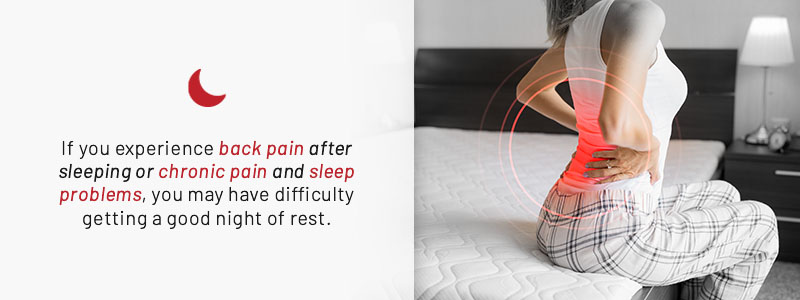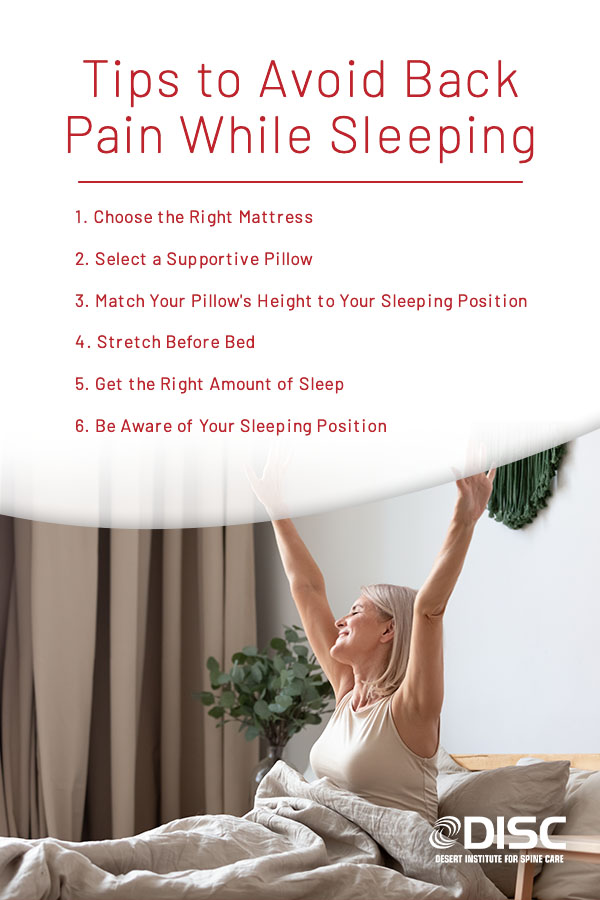
Sleep and pain management often are closely related, as the body requires restorative sleep to heal. There are numerous benefits of sleep for neck and back pain as well as overall health. If you experience chronic pain, finding the best way to sleep for back pain can help you experience the deep, restful, and healing sleep your body needs. Learn how to sleep with low back pain and how quality sleep can help heal your body.
Visit Here to Schedule an Appointment
If you experience back pain after sleeping or chronic pain and sleep problems, you may have difficulty getting a good night of rest. Waking up from a night of sleep to back or neck pain can make going about your day difficult or uncomfortable. Neck and back pain are common and are often one of the first things someone notices when waking up in the morning. While there are several causes of neck and back pain, some of the most common causes include:

Sleep is a critical process that plays an essential aspect in your body recovering and healing from the day. While we sleep, our body’s biological systems are active, renewing and repairing on a cellular level. Sleep plays a vital role in our body’s weight maintenance, immunity, and mood. Studies have shown one in three adults doesn’t get enough sleep, dramatically affecting the body’s various processes.
There is a common link between pain and sleep. While pain often affects the quality of sleep, sleep also plays an important role in managing pain. Short amounts of sleep, poor sleep quality, and fragmented sleep can heighten pain sensitivity. Pain and sleep appear to share similar neurotransmitters and pathways.

Melatonin is known for its role in helping to regulate the circadian rhythm. Ongoing research continues to reveal melatonin’s role in our ability to perceive pain. A lack of proper sleep has also been shown to lead to increased inflammation. Additionally, sleep deprivation has been found to directly affect the pain threshold and the brain’s capacity for pain, making people more sensitive to pain. If we cannot get proper rest, our bodies are more susceptible to pain and discomfort.
Fibromyalgia is a condition closely affected by pain and sleep. For patients with fibromyalgia, improved sleep has been shown to decrease painful symptoms. Sleep deprivation increases pain sensitivity by numbing the brain’s pain-killing response.
Proper sleep has several healing abilities, including:
Decreasing pain sensitivity: Sleep deprivation can change the brain’s circuitry and amplify pain. Adequate sleep can help restore proper pain sensitivity levels and allows our brain’s pain-killing response to work properly.
Promotes healing: As you sleep, your brain and body can focus on recovering and healing. If you experience an injury when you sleep, the brain releases hormones that encourage tissue growth to repair blood vessels. This process helps wounds heal faster and restores damaged or sore tissues, muscles, and joints.
Improves mental health: Many people who have chronic pain often experience negative moods or even depression. Mental health can also take a toll on the physical body. Depression can lead to loss of appetite, sleep disturbances and lower physical activity levels, contributing to worsening physical pain. A proper sleep schedule can improve mood, anxiety, and depressive symptoms.
Provides energy: One of the most obvious and important aspects of sleep is that it provides us with energy. Sleep allows both our body and mind to recharge and recover from the day’s events. Sleep is vital for our body’s various physical processes and immune system functioning. Without an adequate amount of sleep, the body and brain are unable to function properly.
Sleep and healing injuries are closely related. A lack of sleep can contribute to increased pain sensitivity and inhibit your brain’s ability to manage painful symptoms properly. While a lack of sleep does not necessarily increase the amount of pain someone has, it can increase how much pain they perceive. Many conditions may affect your ability to sleep. One of the most common medical reasons for poor sleep is insomnia.
Insomnia is categorized as difficulty falling or staying asleep. Insomnia may have several causes, but chronic pain is a leading cause of insomnia. In many cases, chronic pain and insomnia are co-occurring conditions that often directly affect one another. Those with chronic pain may have difficulty falling asleep or getting comfortable enough to stay asleep, resulting in insomnia. On the other hand, insomnia often causes sleep deprivation, causing increased sensitivity to pain.
Research has found that chronic pain patients report higher levels of pain if they experience insomnia than those chronic pain patients who do not have trouble sleeping. Sleep disturbance often causes more frequent and longer periods of being awake while sleeping, longer sleep onset, and lower sleep efficiency. Insomnia treatments include prescription medication and cognitive behavioral therapy.

Sleep and chronic pain often go hand-in-hand. Unfortunately, pain can wake you up from sleep and make falling asleep difficult. Back pain after sleeping is a common issue many people may face, which negatively impacts their quality of sleep and day-to-day life. Not sleeping because of pain can cause a person to miss out on essential restorative sleep that the body needs. If you can’t sleep because of pain, you may want to consider these tips:
[widgetkit id=”58″]
Desert Institute for Spine Care is a leading provider of medical travel options for all your spinal care needs. We are an orthopedic spine center that strives to provide the highest level of patient care. We offer spine treatments and endoscopic spine surgery to treat various spinal conditions. Our team of experts is dedicated to offering individualized, compassionate care to each of our patients. We offer innovative, state-of-the-art treatments, ranging from non-surgical to minimally invasive options.
To learn more about our services or meet with one of our physicians, schedule an appointment online.